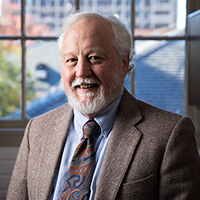CRISPR gene-editing technology is being investigated in research labs around the world in hopes that it might change medicine forever. UNC bioethics professors led by Eric Juengst, PhD, MA, and Jean Cadigan, PhD, weigh in.

CRISPR gene-editing technology is being investigated in research labs around the world in hopes that it might change medicine forever. UNC bioethics professors led by Eric Juengst, PhD, MA, and Jean Cadigan, PhD, weigh in.


November 28, 2018
On the same day a Chinese scientist announced he had used CRISPR gene editing technology to give twin babies resistance to HIV infection, a team of UNC School of Medicine bioethics professors published a paper entitled “Is Enhancement the Price of Prevention in Gene Editing?” in The CRISPR Journal November 26.
“Our paper shows how easy it could be to slide from ‘preventive’ uses of gene editing for medical-related applications into ‘enhancement’ uses for personal applications – so-called designer babies,” said Eric Juengst, professor of social medicine and director of the UNC Center for Bioethics. “To better anticipate developments like the Chinese intervention, those in charge of developing rules for gene-editing research will need better ways to take account of relevant basic and animal research as it emerges internationally.”
The authors wrote:
“Most experts are in broad agreement that research should prioritize medical applications over attempts to enhance human traits. However, there is little consensus about what counts as human enhancement in this context, or how to deal with the issues it flags. Moreover, several influential reports interpret medical applications to include disease prevention as well as treatment as a goal for gene-editing research. This challenges the current policy consensus because using gene editing to prevent disease would incidentally facilitate human enhancement applications in a variety of ways. If such research efforts are penalized by policy concerns about enhancement, then their preventive health benefits could be lost. To avoid being caught off guard by such challenges, science policy makers will need to think more carefully about what “prevention” might mean in the gene-editing context, and develop research governance that can anticipate and address the human enhancement concerns it will raise. To accomplish the latter, the scope of policy making will need to expand from its narrow focus on human clinical trials to engage with basic researchers driving the translational pipeline toward preventive gene editing and the science policy makers who have to address its “off-label” uses.
The entire paper is available here.
To speak to one of the authors, contact Mark Derewicz at 984.974.1915, mark.derewicz@unchealth.unc.edu